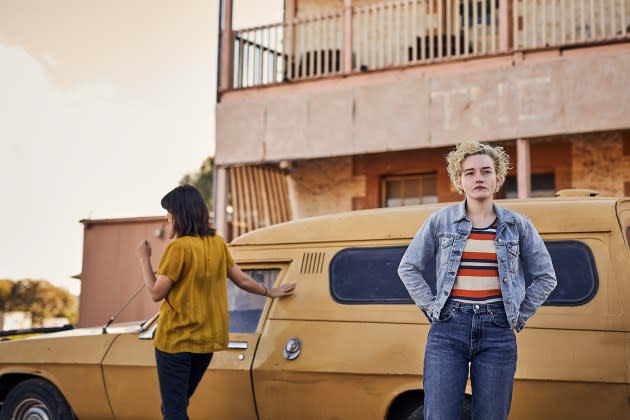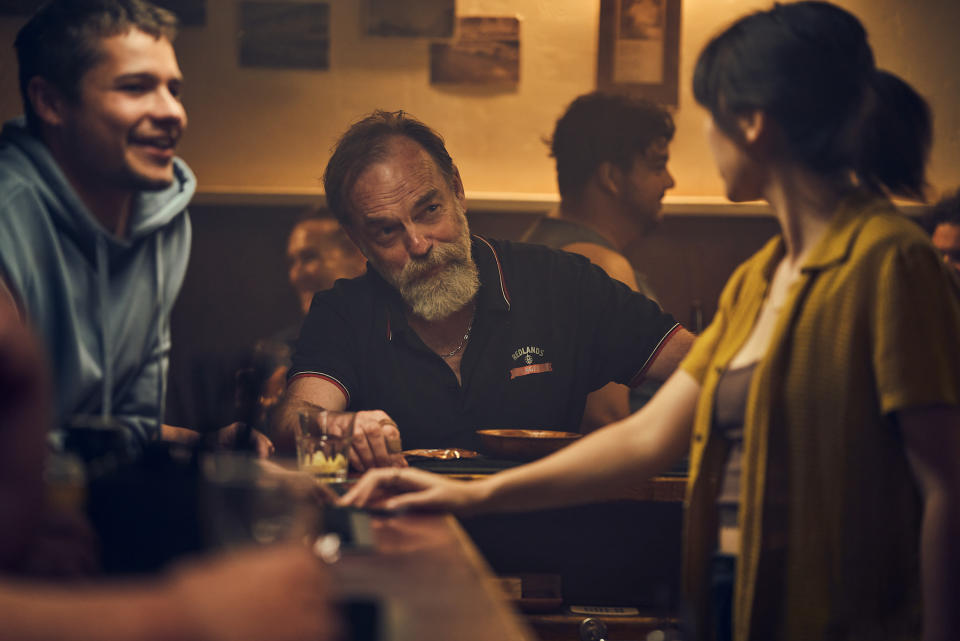‘The Royal Hotel’ Is Every Woman’s Toxic-Masculinity Nightmare
- Oops!Something went wrong.Please try again later.
- Oops!Something went wrong.Please try again later.

“They’re all nice for a minute,” says Kitty Green, director of the sizzling thriller The Royal Hotel. She’s talking about the men that make up most of the film’s ensemble cast — Australian miners in a remote, rugged, Outback town — who can pivot from playful pub banter to grinning malevolence without warning. What might they do after one pint too many?
It’s a question any young woman tending bar has asked herself, and in Green’s frighteningly plausible tale, the heavily outnumbered women serving these men drinks are Hanna (Julia Garner) and Liv (Jessica Henwick), Canadian backpackers looking to make some quick cash so they can travel somewhere nicer. Hours away from civilization as they know it, they accept a room and temporary job from Billy (Hugo Weaving), the dissolute proprietor of what seems to be the only watering hole in town. Some initial disappointments and oddities — the hotel’s bone-dry swimming pool, a cat on the stairs that won’t move out of the way — are soon supplanted by the double-edged attention of the male clientele, who size the pair up as “fresh meat.”
More from Rolling Stone
'How to Fix a Pageant': Miss USA Doc Reveals Eye-Opening Allegations
A New Louis C.K. Doc Explores Why the Comedian Wasn't Canceled for Sexual Harassment
Green’s last film, The Assistant, also starred Garner in a claustrophobic, hellishly masculine workplace, but a corporate one. The Royal Hotel strips away the business attire to explore a state of nature, like Lord of the Flies if the boys were grown adults and starving for sex. “It’s all being fueled by the alcohol,” says Green, which makes for a “scary aggression” and “unpredictable kind of energy.” In this story, she’s “looking at some situations that I’ve been in where I felt a little uncomfortable, and trying to represent that on screen. And some of those nights can be a little creepy.”
Hanna is quicker to vent her disgust at the vulgar atmosphere, with Liv more inclined to brush off any perceived microaggressions as “a cultural thing.” But Hanna can’t shake a gnawing sense of cruelty in what the miners supposedly intend as provocative humor, from calling her “sour cunt” to catching, killing, and preserving a snake in a fishbowl, then labeling it with her name. In this harrowing context, even a cliché bit of harassment (“Wouldn’t hurt you to smile a bit!”) is loaded with violent potential.
“I think it plays very differently in Australia than it does [in the U.S.],” Green says, turning the movie into a fascinating litmus test on gender dynamics: Hanna’s immediate suspicions may resonate with one viewer, while another, like Liv, might want to give the roughnecks the benefit of the doubt. “To Australians, the place isn’t that scary, and it isn’t,” Green explains. “There are more on Liv’s side than Hanna’s side for a good twenty minutes, half an hour. And then there’s a point where it shifts for Australian audiences.” When she screened The Royal Hotel for Americans, one friend was immediately shocked, telling her, “This place is crazy. Everyone’s deranged.”
Still, Hanna and Liv aren’t immune to some of the customers’ charms, and when Matty (Toby Wallace), the least hardened of them, takes the women to a waterfall oasis, an idyllic vacation appears to present itself at last. Yet these more successful flirtations mask an unspoken competition and entitlement among the larger group, who, after all, are also far from their homes, lonesome and laboring on behalf of a brutal, extractive industry. They come to see the women, too, as theirs for the taking.
“We were careful not to make it about a rural community,” Green says. “So these aren’t farmers, they’re not people that have lived out there forever. Mining towns, they fly people in from all over Australia, just for the job. And I think that sense of isolation, when it’s new to you, or it’s not where you grew up, plus alcohol and a lack of women in general in that town, means that it is the right environment for some bad behavior.”

Perhaps the single lifeline Liv and Hanna have is Carol (Ursula Yovich), an Aboriginal woman who helps run the hotel and is evidently a long-suffering partner of sorts to Billy. Green points out that although their characters’ relationship is breaking down, Weaving and Yovich attain a “tender and gentle” chemistry “amongst the messiness” of the main plot — a reminder of love’s fragility in a dangerous world. Indeed, it’s when Billy injures himself in a drunken accident and Carol has to drive him to a distant hospital, first warning our protagonists that they shouldn’t stick around, that the social order collapses, as if it always rested on their weary shoulders.
From there, The Royal Hotel becomes a more familiar kind of battle for survival, though not without a few more nasty surprises. If the finale pays off, it’s thanks to the convincing escalation that got us there. Which makes perfect sense: Green got her start making documentaries, and based this screenplay with co-writer Oscar Redding on the documentary Hotel Coolgardie, which chronicled the experience of two Finnish backpackers tending bar in a Western Australia mining town.
And while we fear for Liv and Hanna as victims of testosterone-fueled madness, Green focuses on the courage they have to defy it, relating “the strength of the [women] in the documentary” to Hanna’s insistence on setting boundaries from the start — despite the overwhelming pressure to accept routine forms of harassment and abuse. As Green puts it: “She’s able to say, ‘No.'” In the end, this refusal will have to take the form of action, and for that, the guys have no one to blame but themselves.
Best of Rolling Stone

